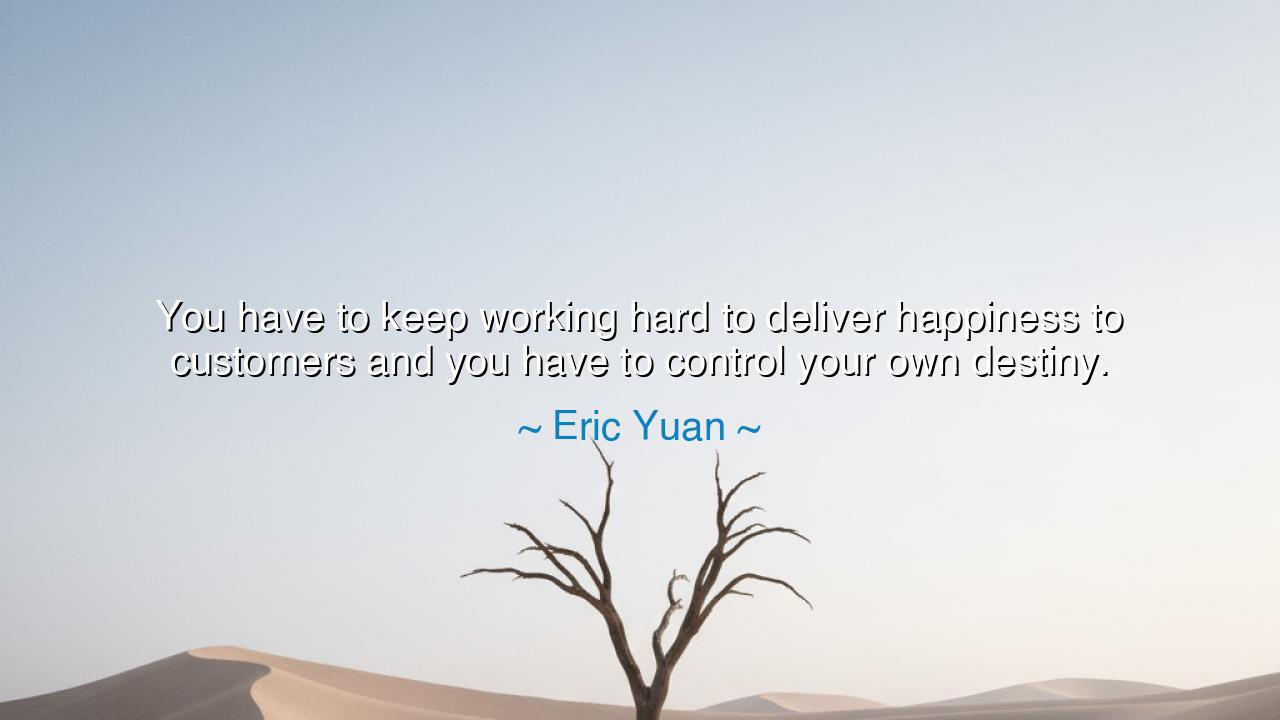
You have to keep working hard to deliver happiness to customers
You have to keep working hard to deliver happiness to customers and you have to control your own destiny.






When Eric Yuan said, “You have to keep working hard to deliver happiness to customers and you have to control your own destiny,” he spoke not only as a builder of technology, but as a builder of philosophy — one forged from endurance, service, and self-mastery. In these words echo the teachings of the ancients: that life’s worth is measured not by what we possess, but by what we create for others, and that destiny is not a chain of fate but a craft shaped by our own hands. To “deliver happiness” is to make one’s labor an act of love; to “control your own destiny” is to refuse to drift like a leaf upon the wind. Together, these ideas form a creed both noble and timeless: work with purpose, serve with joy, and steer your own course through life’s storms.
The ancients would have nodded at this wisdom. The philosopher Epictetus taught that while no man can command the winds, he can adjust his sails. This is the essence of Yuan’s teaching — that life, business, and service are not dictated by luck or by others’ will, but by the courage to direct one’s own journey. “Control your own destiny” does not mean domination or arrogance; it means responsibility — the sacred duty to shape one’s path through discipline and vision. The wise understand that fate favors the industrious, and that fortune bows only to those who dare to persist when comfort calls them to rest.
And yet Yuan’s words are not only about ambition; they are about service, the highest form of purpose. “Deliver happiness,” he says — not profit, not recognition, but joy. This is a truth even kings often forget: that greatness comes not from being served, but from serving well. In ancient Japan, the samurai were bound by bushidō, the “way of the warrior,” which taught that honor was found not in conquest, but in devotion — to one’s master, one’s people, and one’s craft. The same spirit lives in Yuan’s creed: to work tirelessly, not for one’s own comfort, but for the happiness of others. For the one who gives joy multiplies his own; and the one who uplifts others, uplifts himself.
History offers many mirrors for this truth. Consider the story of Marcus Aurelius, the Roman emperor who ruled with a philosopher’s heart. Though burdened by war and plague, he wrote in his private meditations, “A man’s worth is measured by the things he pursues.” Despite commanding armies, he believed his greatest task was to serve his people faithfully, to bring peace and order, to improve even one day of their lives. His destiny was not written in the stars, but carved in the quiet hours of reflection and work. Like Yuan, he understood that the ruler — or the leader — is the first servant. To labor for the happiness of others is to walk the path of immortality, for such deeds do not fade.
But Yuan’s message holds another layer — a warning and a challenge. To control one’s destiny requires vigilance against complacency. The one who stops striving, who ceases to improve, surrenders his life to the will of others. The ancients called this the “death of the spirit,” when a man becomes a passenger in his own ship. The Stoics, the scholars, the monks — all knew that the world’s peace begins with the mastery of self. Thus, to labor is not only to build a company or a dream, but to refine one’s own soul, to forge discipline in the fires of effort. For the one who works faithfully toward good, destiny becomes not a mystery, but a mirror reflecting his own strength.
We must remember, too, that happiness cannot be forced; it must be cultivated. Just as the farmer cannot command the seed to grow, but must till the soil and wait for the rain, so must we labor with patience. The happiness we deliver to others — whether customers, friends, or family — comes not from grand gestures, but from consistency, sincerity, and care. Every act of honesty, every small kindness, every task done well becomes a drop in the ocean of joy that sustains the world.
So, dear listener, take this teaching to heart. Work hard, not for vanity, but for purpose. Serve others, not from duty, but from love. Shape your destiny, not by wishing, but by action. Begin each day with the question, “Whom can I make happier by what I do?” and end each evening with, “Did I guide my life, or did I let it drift?” In this, you will find both strength and serenity. For the one who labors with gratitude and governs his own path becomes like a lighthouse — steadfast in storm and calm alike, shining so that others may find their way.
And this is the secret that Yuan’s words reveal: Happiness is born from effort, and destiny belongs to the devoted. The path may be long, but each step walked with intention turns struggle into glory. The ancients would have called such a person “master of himself” — the rare soul who, by serving others with all his heart, becomes truly free.






AAdministratorAdministrator
Welcome, honored guests. Please leave a comment, we will respond soon